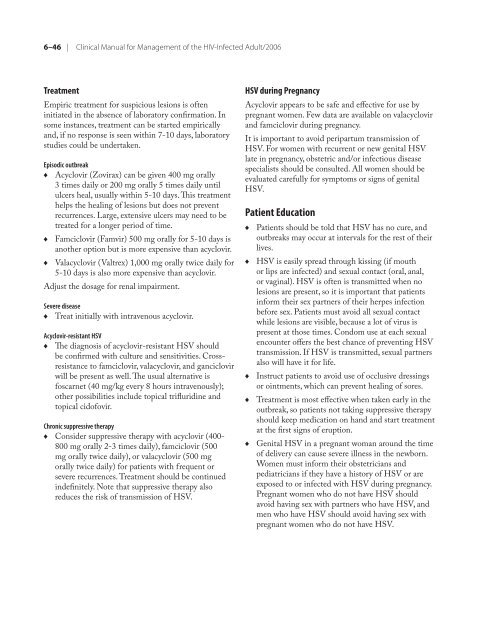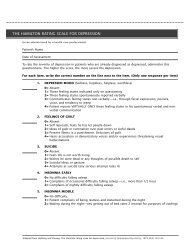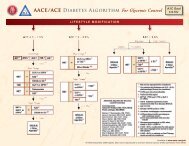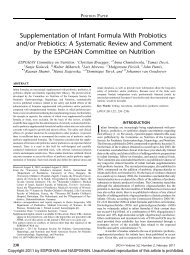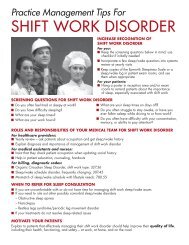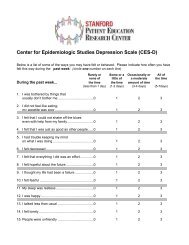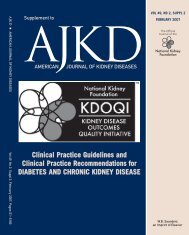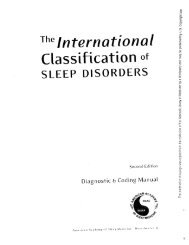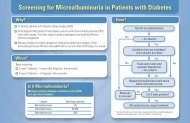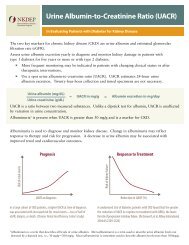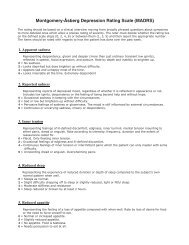Clinical Manual for Management of the HIV-Infected ... - myCME.com
Clinical Manual for Management of the HIV-Infected ... - myCME.com
Clinical Manual for Management of the HIV-Infected ... - myCME.com
You also want an ePaper? Increase the reach of your titles
YUMPU automatically turns print PDFs into web optimized ePapers that Google loves.
6–46 | <strong>Clinical</strong> <strong>Manual</strong> <strong>for</strong> <strong>Management</strong> <strong>of</strong> <strong>the</strong> <strong>HIV</strong>-<strong>Infected</strong> Adult/2006<br />
Treatment<br />
Empiric treatment <strong>for</strong> suspicious lesions is <strong>of</strong>ten<br />
initiated in <strong>the</strong> absence <strong>of</strong> laboratory confirmation. In<br />
some instances, treatment can be started empirically<br />
and, if no response is seen within 7-10 days, laboratory<br />
studies could be undertaken.<br />
Episodic outbreak<br />
♦ Acyclovir (Zovirax) can be given 400 mg orally<br />
3 times daily or 200 mg orally 5 times daily until<br />
ulcers heal, usually within 5-10 days. This treatment<br />
helps <strong>the</strong> healing <strong>of</strong> lesions but does not prevent<br />
recurrences. Large, extensive ulcers may need to be<br />
treated <strong>for</strong> a longer period <strong>of</strong> time.<br />
♦<br />
♦<br />
Famciclovir (Famvir) 500 mg orally <strong>for</strong> 5-10 days is<br />
ano<strong>the</strong>r option but is more expensive than acyclovir.<br />
Valacyclovir (Valtrex) 1,000 mg orally twice daily <strong>for</strong><br />
5-10 days is also more expensive than acyclovir.<br />
Adjust <strong>the</strong> dosage <strong>for</strong> renal impairment.<br />
Severe disease<br />
♦ Treat initially with intravenous acyclovir.<br />
Acyclovir-resistant HSV<br />
♦ The diagnosis <strong>of</strong> acyclovir-resistant HSV should<br />
be confirmed with culture and sensitivities. Crossresistance<br />
to famciclovir, valacyclovir, and ganciclovir<br />
will be present as well. The usual alternative is<br />
foscarnet (40 mg/kg every 8 hours intravenously);<br />
o<strong>the</strong>r possibilities include topical trifluridine and<br />
topical cid<strong>of</strong>ovir.<br />
Chronic suppressive <strong>the</strong>rapy<br />
♦ Consider suppressive <strong>the</strong>rapy with acyclovir (400-<br />
800 mg orally 2-3 times daily), famciclovir (500<br />
mg orally twice daily), or valacyclovir (500 mg<br />
orally twice daily) <strong>for</strong> patients with frequent or<br />
severe recurrences. Treatment should be continued<br />
indefinitely. Note that suppressive <strong>the</strong>rapy also<br />
reduces <strong>the</strong> risk <strong>of</strong> transmission <strong>of</strong> HSV.<br />
HSV during Pregnancy<br />
Acyclovir appears to be safe and effective <strong>for</strong> use by<br />
pregnant women. Few data are available on valacyclovir<br />
and famciclovir during pregnancy.<br />
It is important to avoid peripartum transmission <strong>of</strong><br />
HSV. For women with recurrent or new genital HSV<br />
late in pregnancy, obstetric and/or infectious disease<br />
specialists should be consulted. All women should be<br />
evaluated carefully <strong>for</strong> symptoms or signs <strong>of</strong> genital<br />
HSV.<br />
Patient Education<br />
♦<br />
♦<br />
♦<br />
♦<br />
♦<br />
Patients should be told that HSV has no cure, and<br />
outbreaks may occur at intervals <strong>for</strong> <strong>the</strong> rest <strong>of</strong> <strong>the</strong>ir<br />
lives.<br />
HSV is easily spread through kissing (if mouth<br />
or lips are infected) and sexual contact (oral, anal,<br />
or vaginal). HSV is <strong>of</strong>ten is transmitted when no<br />
lesions are present, so it is important that patients<br />
in<strong>for</strong>m <strong>the</strong>ir sex partners <strong>of</strong> <strong>the</strong>ir herpes infection<br />
be<strong>for</strong>e sex. Patients must avoid all sexual contact<br />
while lesions are visible, because a lot <strong>of</strong> virus is<br />
present at those times. Condom use at each sexual<br />
encounter <strong>of</strong>fers <strong>the</strong> best chance <strong>of</strong> preventing HSV<br />
transmission. If HSV is transmitted, sexual partners<br />
also will have it <strong>for</strong> life.<br />
Instruct patients to avoid use <strong>of</strong> occlusive dressings<br />
or ointments, which can prevent healing <strong>of</strong> sores.<br />
Treatment is most effective when taken early in <strong>the</strong><br />
outbreak, so patients not taking suppressive <strong>the</strong>rapy<br />
should keep medication on hand and start treatment<br />
at <strong>the</strong> first signs <strong>of</strong> eruption.<br />
Genital HSV in a pregnant woman around <strong>the</strong> time<br />
<strong>of</strong> delivery can cause severe illness in <strong>the</strong> newborn.<br />
Women must in<strong>for</strong>m <strong>the</strong>ir obstetricians and<br />
pediatricians if <strong>the</strong>y have a history <strong>of</strong> HSV or are<br />
exposed to or infected with HSV during pregnancy.<br />
Pregnant women who do not have HSV should<br />
avoid having sex with partners who have HSV, and<br />
men who have HSV should avoid having sex with<br />
pregnant women who do not have HSV.


